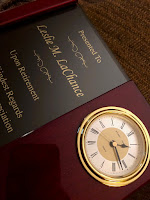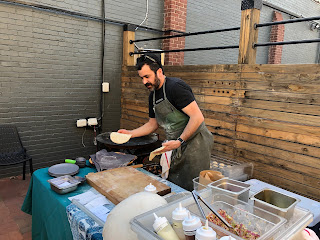How is it that humans can hold so many disparate emotional postures at the same time, like we're some kind of psychological acrobats? People, people, we ALL do it, ALL the time. I don't know how. Magic? Denial?
Earlier this month, I lost a good friend to ovarian cancer. Ann died on her wife Kate's birthday. I hadn’t been able to see my friends recently, because Ann and Kate live far away, and either Ann was too sick and/or in treatment or I was; we kind of took turns at being cancer-chronic. But Ann and I spoke on the phone a few days before she fell silent forever. I could tell she was in some pain; her voice sounded small and squinched. She was scared and really sad, but she also felt completely loved and cared for by her amazing wife, who is now carrying an unfathomable grief. Ann was a brilliant and funny woman, a voracious reader, and a wry humorist. Here's a favorite memory: when she learned I'd never seen the movie Steel Magnolias some years after its release, she made me sit down and watch it with her, and performed all the best bits of dialog as they happened, with appropriately exaggerated accents. I was quite literally rolling on the floor laughing. We laughed together a lot, and that kind of joy is a precious thing. Most of all my friend was profoundly kind, instinctively compassionate, and extravagantly generous. Sometimes I think her heart was too big for this world.
And here I am, just walking around in a life with an Ann-shaped hole in it. We've all got those holes shaped like people we have lost, and the grief that frames them. And yet, we get up with our grief in the middle of a roaring, thumping world that's constantly summoning us to do all the things. We work. We eat. We tend to what's in front of us, and eventually we'll open that pile of mail. Of course we've got issues with mortality. We have to sit with our grief, but the world won't let us do it for very long. And though lots of folks are happy to tell you they have the answers about where we're all going when we die, I find myself suspicious of such certainty. And I'm a person of faith. I know that's a strange thing for someone like me to say. Though I am by nature hopeful, I am perhaps in some proportion as much distrustful and doubtful, and I have had from time to time a dalliance with despair. So my faith is a weird little beast. Instead of being based on a dogmatic assertion – that stalwart belief in an all-loving higher power who is going to take care of me even when I die – my wee beastie faith looks more like a question. And, weirder still, I don't know what the question is, only that the kind of faith I have feels like one. Maybe that's because a question comes from yearning, and yearning relies on faith, even vague yearning, because there is something for which we yearn, even if we don't know what it is. So faith is part of that reaching out, that yearning.
But I don't know. And I'm fine with that.
And here I am, just walking around in a life with an Ann-shaped hole in it. We've all got those holes shaped like people we have lost, and the grief that frames them. And yet, we get up with our grief in the middle of a roaring, thumping world that's constantly summoning us to do all the things. We work. We eat. We tend to what's in front of us, and eventually we'll open that pile of mail. Of course we've got issues with mortality. We have to sit with our grief, but the world won't let us do it for very long. And though lots of folks are happy to tell you they have the answers about where we're all going when we die, I find myself suspicious of such certainty. And I'm a person of faith. I know that's a strange thing for someone like me to say. Though I am by nature hopeful, I am perhaps in some proportion as much distrustful and doubtful, and I have had from time to time a dalliance with despair. So my faith is a weird little beast. Instead of being based on a dogmatic assertion – that stalwart belief in an all-loving higher power who is going to take care of me even when I die – my wee beastie faith looks more like a question. And, weirder still, I don't know what the question is, only that the kind of faith I have feels like one. Maybe that's because a question comes from yearning, and yearning relies on faith, even vague yearning, because there is something for which we yearn, even if we don't know what it is. So faith is part of that reaching out, that yearning.
But I don't know. And I'm fine with that.














































